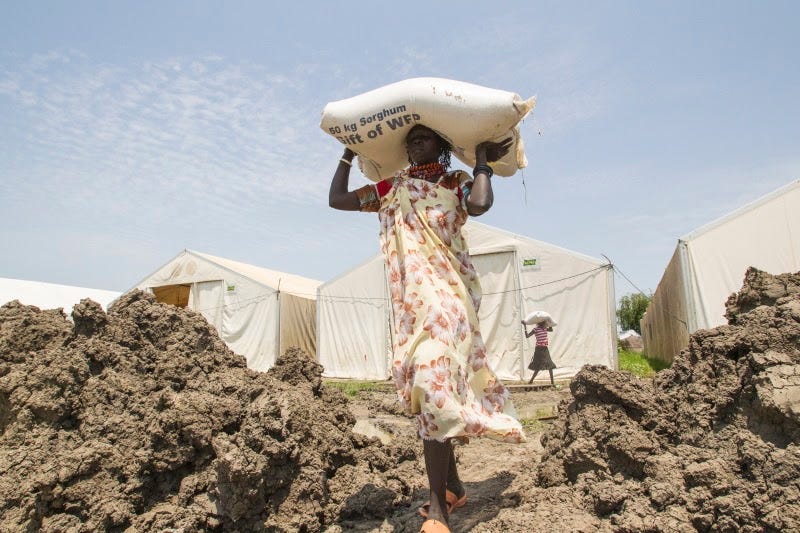IMF, World Bank abuses boost rich country fortunes
Big business is profiting off the worst poverty crisis in history

Enjoy this special edition of Contention -- it will take just about five minutes to read. We don’t cover the same things as every other outlet. If you want more coverage like this, please subscribe:
The annual meetings of the International Monetary Fund (IMF) and World Bank aren’t really front page news, despite their crucial roles in the functioning of the global economy. We here at Contention have decided to dig in further following our reporting on Monday, because the stakes cannot be higher: First World security is putting hundreds of millions of lives at risk.
The world’s poor -- roughly half the global population -- are facing an unprecedented crisis. As we noted on Monday, the IMF last week downgraded developing country growth estimates -- excluding China -- from a 5% drop to 5.7%. For comparison, last year they called 4.1% growth in these countries “sluggish.”
Altogether the World Bank estimates that 110 to 150 million new people will slip into what it calls “extreme poverty” -- less than $1.90 a day. Earlier this year the IMF said that the crisis would wipe out seven to 10 years of “extreme poverty” reduction.
This is possibly the most rapid de-development in history, and it’s even worse than it sounds: this summer U.N. Special Rapporteur on extreme poverty and human rights Philip Alston left his post with a scathing report calling the $1.90 poverty line “scandalously unambitious.” The benchmark has no empirical basis, and falls far short of even the most meager living standards in the world’s poorest countries.
At $5.50 a day -- the “middle income” level still below actual poverty conditions in the Global South -- there has been zero progress against poverty since 1990.
The collapse has predictable consequences. Last week the World Food Programme won the Nobel Peace Prize, warning the world of a “hunger crisis of inconceivable proportions” unless the group can raise $6.8 billion in the next six months. As we reported earlier this month the crisis is especially acute in Latin America which will experience a 270% increase in severe food insecurity. Apprehensions along the U.S. southern border have surged 238% this year as families flee starvation in their home countries.
The IMF and World Bank have met this crisis with characteristic exploitation and incompetence. The World Bank has responded with its “Mobilizing Finance for Development” program, directing fully 68% of its COVID response funding to financial institutions, not needy populations. The IMF, as we noted on Monday, has included austerity measures in 84% of its loans.
Again, the IMF may say that they think austerity doesn’t work, but they keep doing it because it’s crucial for business interests in rich countries.
First and foremost, a majority of the debt squeezing these countries into the arms of the IMF and World Bank is held by private financiers. Developing country debt more than doubled over the last decade, and debt among low-income countries eligible for the G20’s Debt Service Suspension Initiative (DSSI) grew 9.5% in 2019 alone.
Central bank interest rate suppression has created a “hunt for yield” in the First World, driving investors into more and more exotic assets as they seek guaranteed returns. Emerging market (EM) sovereign debt has a higher risk profile (and therefore a higher interest rate) than rich country bonds, but as Goldman Sachs told its customers just last week, “sovereign governments generally default less than companies.”
This is because unlike private companies, sovereign governments can’t declare bankruptcy to restructure their debts -- and default means hyperinflation, unrest, and mass suffering for their populations. IMF loans are a last resort to stave off default, and these loans are financed First World government contributions. This means that private creditor EM debt plays are effectively underwritten by rich country governments.
The political terms of these IMF loans then hold down wages, remove investment barriers, force debtor governments to sell valuable public assets at bargain prices, and eliminate capital controls so that businesses can bring their money back home. Debtor countries have nothing to show for any of it, hence their lack of real development for more than 30 years.
And this has a huge upside for people living in rich countries, as the countries selling most of the world’s raw materials, agricultural commodities, and cheap labor are price takers. Most important: they can only sell their goods abroad in rich country currencies, which gives the dollar in particular “exorbitant privilege.”
That privilege means that the United States can’t face a balance of payments crisis because it can print money to buy imports. That’s how the U.S. government can throw around debt-financed multi-trillion-dollar relief packages while Zambia faces default and starvation over $120 million in interest payments -- around 5,000 times less than Pelosi’s proposed package.
So of course the media doesn’t want to report on the IMF and World Bank meetings -- they have more important things to talk about and nobody wants to think about 150 million people slipping from desperation into mass death so that we can get another $1,200 check.
Here at Contention we’re proud to have an audience that wants to do something about this system, however, so we’ll keep telling this story, painful as it may be.

Disclaimer
Our only investment advice: Listen to more Fela.
Contact us with feedback or any stories we might have missed.
Photo Credit: U.N. photo


